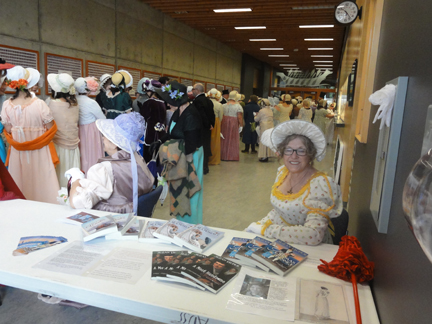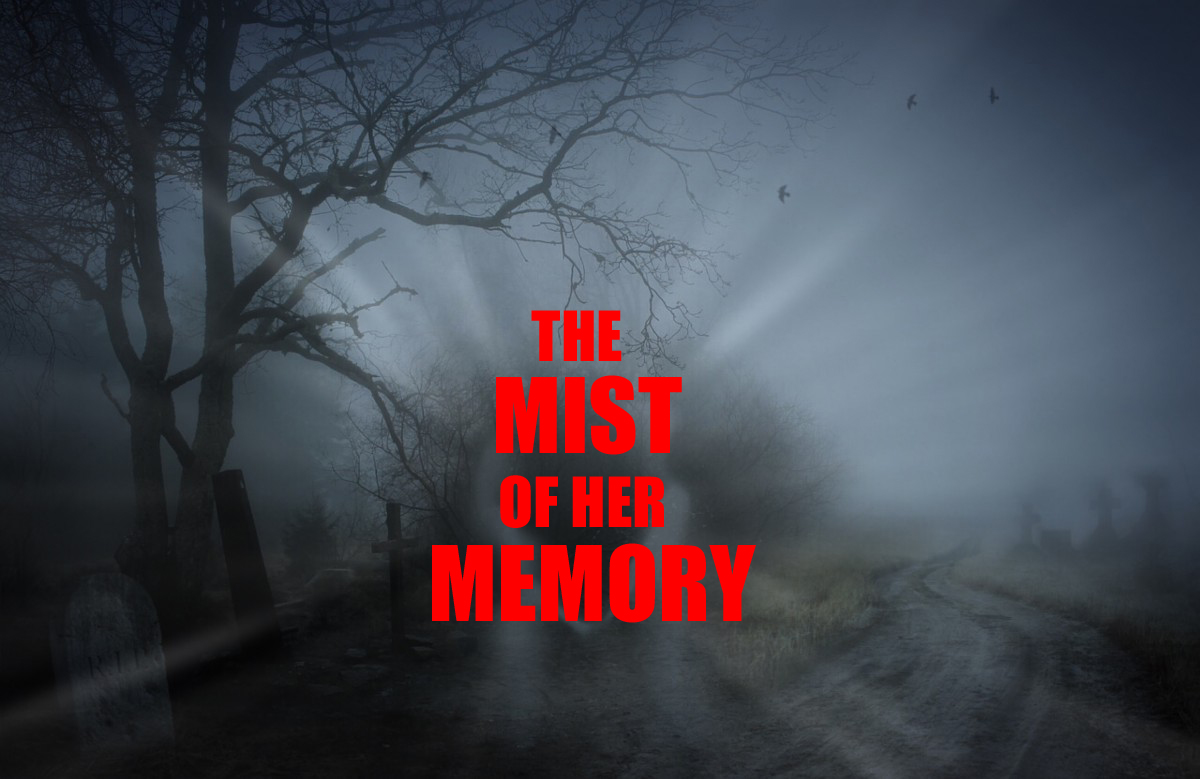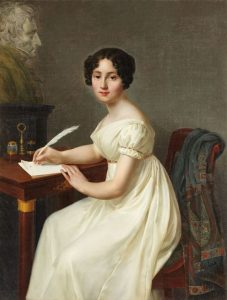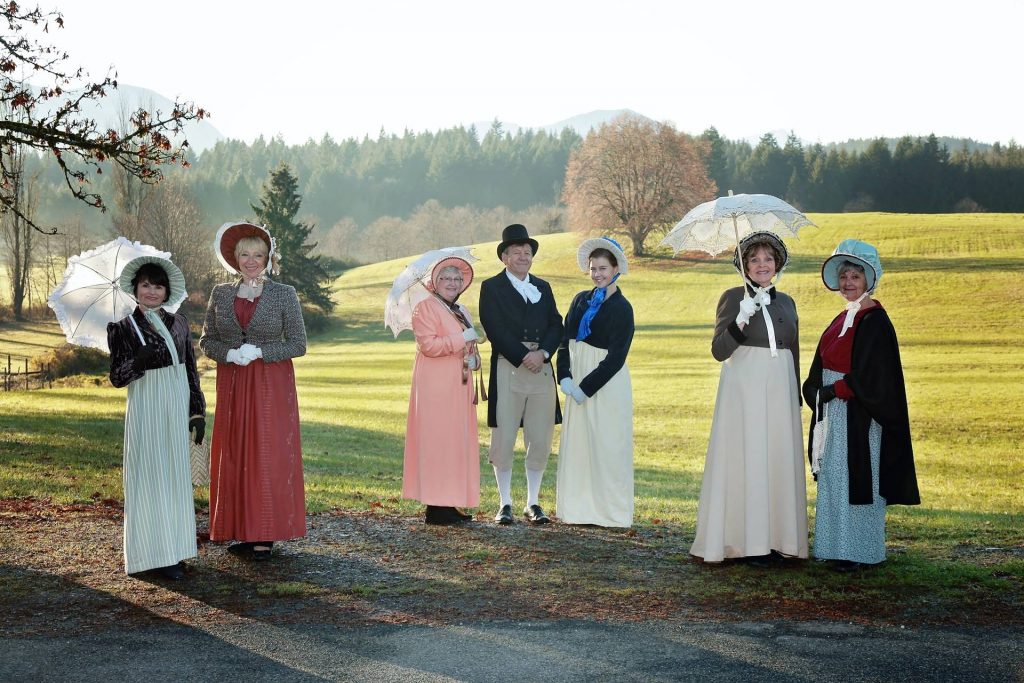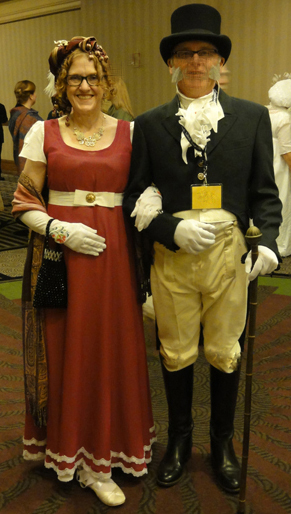Because we’re human, it’s likely that every book will have at least a small number of errors in it. Conventions the author or editor didn’t know about, obvious mistakes that somehow got missed in the dozen or so readings of the book that constitute the editing process, or too few editor reviews because of cost concerns, all these can slip in and mar perfection ever so slightly. But in the end, how many errors are too many?
Due to the death of my old third generation keyboard Kindle, I bought a new Paperwhite. For the month of May 2018, I enjoyed a month of free Kindle Unlimited. That gave me free reign to binge read those Jane Austen Fan Fiction (JAFF) novels that I wanted to read but found too expensive, mostly Austenesque Regency romances. At the same time, several good JAFF books have come out within my favoured cost range (under $5) or had promotions that put them in that price range. So I’ve been on a reading rampage lately and have been inundated by the good, the bad, and the ugly. That reading experience inspired me to write another article on editing and the mistakes that can be made.
One of the first books I read in May was a Pride and Prejudice based book where I detected no errors. This doesn’t mean there weren’t any, but it definitely means that if there were, the mistakes were so minor or even debatable, they didn’t take the reader out of the story. I made a point of crediting the author and editor when I tweeted about my wonderful reading experience and posted the link to the book on Facebook. Now authors, wouldn’t you all like to be the one who got those kind of accolades from your readers? Lesson #1: As an author, your goal is to provide a reading experience with the greatest level of satisfaction that is within your control.
 About a year ago, I re-read my first published novel, Alias Thomas Bennet, and found a handful of clear errors that I didn’t know existed when we edited it. Some were because the editor and I had yet to put those words into our non-Regency words checklists, some were essentially typos that it was easy to get beyond, and all were unlikely to be noticed by the average reader.
About a year ago, I re-read my first published novel, Alias Thomas Bennet, and found a handful of clear errors that I didn’t know existed when we edited it. Some were because the editor and I had yet to put those words into our non-Regency words checklists, some were essentially typos that it was easy to get beyond, and all were unlikely to be noticed by the average reader.
For example, I notice many Regency novels where “snort,” “chuckle,” “guffaw,” are in modern usage, even though “snort” was an animal noise only according to Johnson’s Dictionary of 1811, “guffaw” is a non-Regency word of Scottish origin, and “to chuckle” meant our modern “to guffaw” during the Regency. But in these cases, most readers don’t know any better, and it won’t ruin their reading pleasure. Even the non-Regency “fiancé,” “décolletage,” and “debutante” are tolerated by this picky reader—but barely. What bugs me are modern words like “morph” or “normalcy” or Americanisms such as “okay” and “hello” in a British Regency story. Same for clearly British words like “prat” and “pram” for an American speaker in a novel, unless there is a joke to be had in the use of the word.
Language is not the only issue. In a period story, historical issues should be checked. Did the zoo close down the year before the story was started, and how long did it take to travel through several counties via horseback without killing the horse? The correct title for a member of the peerage is another example of an issue critical to the success of putting the reader in the right time period.
When a story is unpublished, that is, if I’m reading on a web site for writers where there is clearly no professional editor, I cringe and bear it. Sometimes the mistakes are funny. An unpublished author used “palatable” where she meant “palpable,” “jester” for “gesture,” “bought” for “bout,” and the biggest ouch: “roll” for “role.” I’ll have mine with a little butter and jam. Sorry. I felt for her as often as I laughed at the mix-ups. But this story came from a fan fiction web site and was not edited. I got what I paid for.
As a writer, I recently got caught with what I think was a touchpad error on a spell check, because I know the meanings of the two words. Beta ldb531 caught me with “decimate the information” when I meant “disseminate the information” and, at first, I kept re-reading the sentence to try to figure out what was wrong with the rest of it! After that, I just had to laugh! Just this week, my British beta caught me using Americanisms “gotten” and “alright” that got past both American betas. Thankfully, I have no crutches in the way of homonyms like the unpublished writer above does, other than typos–I hope! If I do, I’d better learn from my mistakes! But my current work-in-progress, The Mist of her Memory, will be serially posted on A Happy Assembly after incorporating the corrections found by four excellent betas. After that, the novel version will be published after multiple reviews by a professional editor and proofreader. With any luck, its errors will be gone, or at least that those remaining will be barely noticeable. Remember from past posts: Lesson #6: Beta readers can help an author at all points in the writing process.
I also have problems with commas in my own writing. As is probably evidenced in this unedited article, I put them in where they don’t belong and forget them where they’re needed. But for my books, I have betas and editors to help me. As a reader, I can overlook a missing closing set of quotation marks if it’s not confusing, or even a missing period—it it’s not a frequent mistake.
However, some trends in editing errors may point to a lackadaisical attitude towards one’s readers. A first novel may have errors that the author will learn from—if readers are kind enough to give the appropriate feedback in book reviews. However, multiple mistakes are not so forgivable in later books. Readers should never have to pay for a book that’s full of errors, period. In fact, even if normally a paid book is obtained during a temporary “free” or low-cost promotion, we still deserve our expectations of a smoothly-written book. If the author is asking readers to pay for the pleasure of reading their work, the book should offer that pleasure undaunted by distractions that are within the control of the author! We’re reminded of Lesson #7: Every author listens to and incorporates the advice of one or more professional editors who know the conventions specific to their style, content, subgenre, etc. There are no exceptions. And if your editor sucks, fire him/her!
Readers have a responsibility, too. I tend to rate books better than my gut says to, simply because I’m an author and I don’t want to hurt another author’s feelings. For example, if a book succeeded on many writing measures (e.g., good character development, vibrant scene-setting, suitable tone, well-developed plot and flow, lack of unnecessary plot twists or characters, appropriate prose, reader investment in the protagonists, tight research, lack of plot holes, satisfying ending, realistic and believable premise, unique story line, engaging dialogue, good balance of dialogue and narrative, lack of head-hopping, appropriate use of point of view, memorable story, and others I forgot at the moment) but missed out on two or three of that list, I’ll still give it five stars even though my first impression would say it’s really a three to four star book. But I’ll drop a full star if it has too many blatant editing errors. Yet, I’ve seen reviews for books that are cute but forgettable, don’t deliver the promised angst, have huge plot holes, and/or have head-hopping that’s hard to follow, AND have over a dozen unforgiveable proofreading errors that have been ranked at five stars! That’s not fair to authors who make the effort. Shame on you, readers!
But readers, make sure you know your rules before you complain. We’ve all read of pet peeves in writing. Upon a check of some reader pet peeves, I discovered some supposed errors were merely British spellings (e.g., “colour,” “centre,” “judgement”) or older British Regency spellings or word usage (“gift” as a verb, “fall” for autumn, “realize” are all proper in the British Regency), and others were punctuation issues that were correct in certain circumstances (possessives with two nouns). Of course, many readers’ pet peeves are legitimate errors, and mostly homonyms. But don’t blame authors unless you’ve checked to ensure your information is correct. Remember that rule we suggested for authors? Lesson #5: If in doubt, look it up.
In summation, we all have a responsibility to delivering good-quality books: the reader, the editor, the proofreader, the publisher, but most of all, the author. It’s your name on the cover. Make sure you can be proud of it.
Disclaimer: I’m not a writing expert. I’m just a writer who learned some stuff other writers might like to know instead of learning the hard way. My approach is pragmatic, and my posts are not professionally edited!
~~~
As I noted above, my next novel is called The Mist of her Memory, and it’s in the late stages of beta review in four steps: NinaH served as plot beta, ldb531 was the general beta (line edit and Regency correctness), Anji has been scouring the text for British correctness, and NinaH returned as the proofreader. Anji and ldb531 also served as cold readers in this romantic suspense novel, letting me know how they were feeling about it as each chapter was revealed to them. NinaH offered kitty stories to amuse me as well as her technical observations. The Mist of her Memory will be posted on AHA later this summer, and I hope to have it released as a published novel in early 2019.
~~~

The Centennial Belles in Regency Costume
I’m off on another costuming escapade to once again participate in the Port Alberni Jane Austen Festival and hopefully, up our count for the Guinness World Record of number of people in Regency costume in one place, July 5-8, 2018. I’m going to get to enjoy a production of Persuasion by the Chicago Chamber Opera Company and I’ll be signing books at the Guinness count and the Regency Afternoon Tea, along with an opportunity for a draw for a signed copy of The Mist of her Memory. I’d love for some of my friends to come along and join me, and I can even help with your costume. Tourism destinations in the area consistently make the top ten in the world in travel magazines, so this isn’t just a Jane Austen thing, it’s an experience of a lifetime. Help this small town break the world record!
~~~
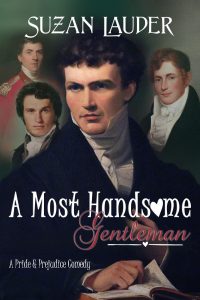 I’m compiling my list of lessons for Learning from My Mistakes and it will be the final post in this series. At that time, I’ll use a random number generator to pick the prize winner for a signed paperback copy of the 2017 top ten reviewer acclaimed Pride and Prejudice comedy A Most Handsome Gentleman, a book bead of A Most Handsome Gentleman, and a choice of a handmade Suzan Lauder signed Regency reticule or a handmade Suzan Lauder signed “Grown-Up Lady” cap and lace tucker set. All commenters for this series, as well as followers of my blog, will be entered for the draw.
I’m compiling my list of lessons for Learning from My Mistakes and it will be the final post in this series. At that time, I’ll use a random number generator to pick the prize winner for a signed paperback copy of the 2017 top ten reviewer acclaimed Pride and Prejudice comedy A Most Handsome Gentleman, a book bead of A Most Handsome Gentleman, and a choice of a handmade Suzan Lauder signed Regency reticule or a handmade Suzan Lauder signed “Grown-Up Lady” cap and lace tucker set. All commenters for this series, as well as followers of my blog, will be entered for the draw.
Like this:
Like Loading...
 I was fortunate to attend a performance of the musical adaptation of “Jane Austen’s Persuasion: A Musical Drama” by Barbara Landis on July 6, 2018 as part of the Port Alberni Jane Austen Festival. It was a brilliant performance highlighted by 49 musical pieces from music of Jane Austen’s time to Irish folk tunes to classic opera, much of which is enhanced by lyrics and arrangements by Landis, who also took the lead roles in the play. Landis is certainly a flexible force behind this production, taking on the role of playwright in this variation of Jane Austen’s shortest novel as a tribute to the 200th anniversary of its publication. In discussion with some of the cast later on, I found out that she also takes a lead financial role and is a sort of mother to the very large cast and team involved in the performance, which has toured the world since 2013. To top off her ties to this situation is the fact that she’s a distant relative of Jane Austen. I’m sure that was as much of an impetus to do this show as any other reason.
I was fortunate to attend a performance of the musical adaptation of “Jane Austen’s Persuasion: A Musical Drama” by Barbara Landis on July 6, 2018 as part of the Port Alberni Jane Austen Festival. It was a brilliant performance highlighted by 49 musical pieces from music of Jane Austen’s time to Irish folk tunes to classic opera, much of which is enhanced by lyrics and arrangements by Landis, who also took the lead roles in the play. Landis is certainly a flexible force behind this production, taking on the role of playwright in this variation of Jane Austen’s shortest novel as a tribute to the 200th anniversary of its publication. In discussion with some of the cast later on, I found out that she also takes a lead financial role and is a sort of mother to the very large cast and team involved in the performance, which has toured the world since 2013. To top off her ties to this situation is the fact that she’s a distant relative of Jane Austen. I’m sure that was as much of an impetus to do this show as any other reason. Many in the audience were particularly enthralled by the two professional Irish dancers, but for me, the cameos that were most enjoyable were the choral music and classical opera, but that’s purely because I love those types of music. This brings up an interesting point about the production: it’s got something for everyone, yet no one style was so overdone that those who weren’t big fans could be tired of it.
Many in the audience were particularly enthralled by the two professional Irish dancers, but for me, the cameos that were most enjoyable were the choral music and classical opera, but that’s purely because I love those types of music. This brings up an interesting point about the production: it’s got something for everyone, yet no one style was so overdone that those who weren’t big fans could be tired of it.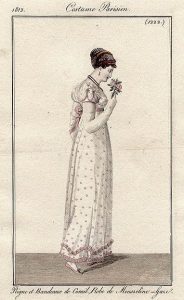
 For those of you who have followed the Thrift Shop Regency Costume Experiment, I made a gown from a Value Village bed sheet at $7.99 and a ton of chenille and lace from Parasina in Mexico at about $5 and tried to match it to a Regency fashion plate for the Port Alberni Jane Austen Festival this year. What do you think? I wore Joe Fresh earrings at $3 and a Jane Austen topaz necklace that was a gift. I also had some ballet flats from Coppel in Mexico on sale at $49–yeah, expensive for me, but super comfortable for a whole day of activities, including the signing and selling of my Jane Austen Fan Fiction novels! As expected, A Most Handsome Gentleman was the most popular, given that many festival-goers had already bought and read the back-list. I got lots of encouraging comments from those fans!
For those of you who have followed the Thrift Shop Regency Costume Experiment, I made a gown from a Value Village bed sheet at $7.99 and a ton of chenille and lace from Parasina in Mexico at about $5 and tried to match it to a Regency fashion plate for the Port Alberni Jane Austen Festival this year. What do you think? I wore Joe Fresh earrings at $3 and a Jane Austen topaz necklace that was a gift. I also had some ballet flats from Coppel in Mexico on sale at $49–yeah, expensive for me, but super comfortable for a whole day of activities, including the signing and selling of my Jane Austen Fan Fiction novels! As expected, A Most Handsome Gentleman was the most popular, given that many festival-goers had already bought and read the back-list. I got lots of encouraging comments from those fans!
